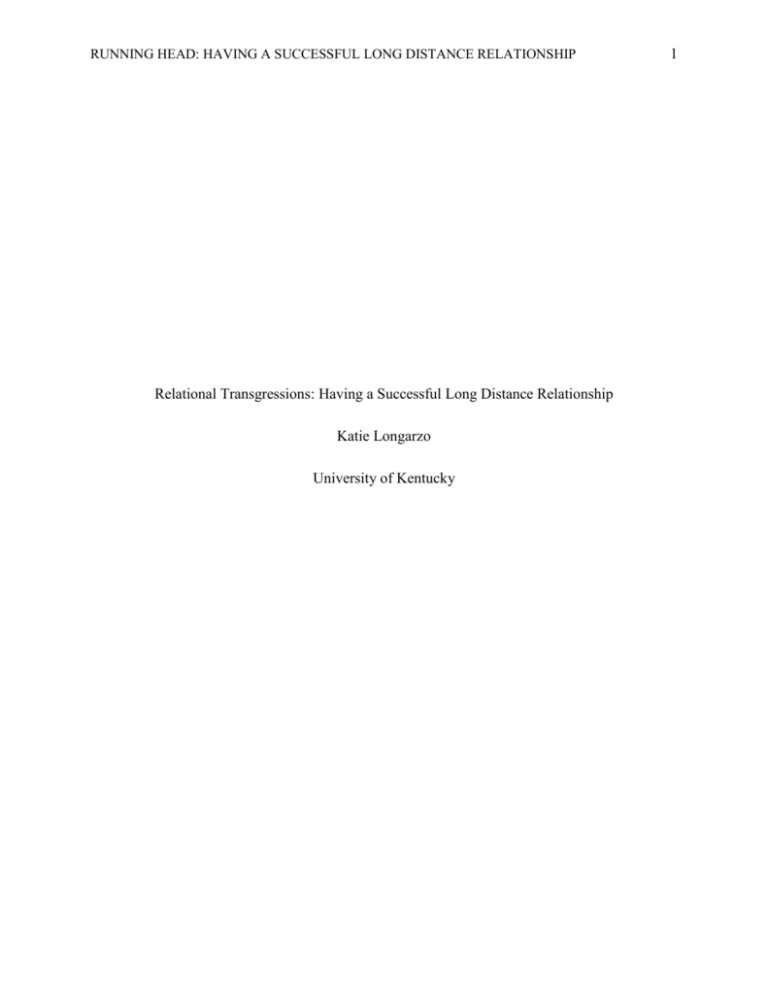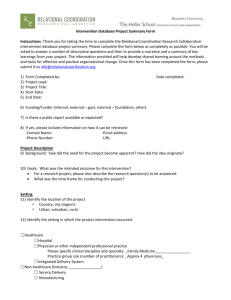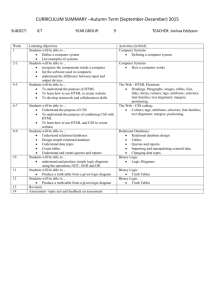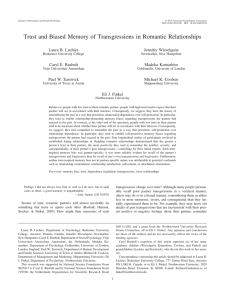
RUNNING HEAD: HAVING A SUCCESSFUL LONG DISTANCE RELATIONSHIP
Relational Transgressions: Having a Successful Long Distance Relationship
Katie Longarzo
University of Kentucky
1
HAVING A SUCCESSFUL LONG DISTANCE RELATIONSHIP
2
Abstract
Relational transgressions can hinder or strengthen any interpersonal relationship. This
paper will take a deeper look into transgressions in long distance relationships and how the
distance can affect coping mechanisms and behavior after a transgression. In a long distance
relationship, trust is incredibly important and thus determines relational stability. Transgressions
like hurtful events, infidelity, and rule violations, can tarnish trust but can also be avoided in
relationships. In this paper, suggestions to avoid these transgressions in long distance
relationships will be discussed. Translational advice for couples living apart from another is
given. Women’s magazine, Cosmopolitan and men’s magazine, Men’s Health are also featured
with advice for long distance couples.
Keywords: Long Distance Relationship, Relational Transgressions, Relational Security,
Negative Affectivity
HAVING A SUCCESSFUL LONG DISTANCE RELATIONSHIP
3
Transgressions in Long Distance Relationships
Transgressions are actions from another that discount you, devalue you, or violate the
assumption of trust and good faith in your relationship (Cupach & Spitzberg, 2007). These
transgressions can happen with any interpersonal relationship including: colleagues, friends,
family members, and relational partners. Depending on the type of relationship and those
involved, the response to a transgression will differ. With some cases, the transgression may
result in the termination of the relationship, where as others may flourish and improve following
the conflict. Betrayal is often used as a synonym when referring to relational transgressions
(Cupach et al., 2007).
Literature Review
Before taking a deeper look at the connection between relational transgressions and long
distance relationships, the following are examples of actual transgressions. Three main
approaches to transgressions are hurtful events, rule violations, and infidelity. Hurtful events can
include ignoring, criticism, teasing, feeling unappreciated or unloved. When in a long distance
relationship, communication is the only aspect a couple has to share with one another. Hearing
harsh criticism or hurtful teasing could ruin one’s self-esteem and confidence in the relationship.
Rule violations are actions that would violate a rule or norm of the relationship. This may be
something expected of your partner, or one that has been explicitly discussed as unacceptable.
These explicit rules could be anywhere from promising to avoid excessive drug or alcohol use, if
that has been a problem in the past, to not seeing a former intimate partner. Breaking an explicit
rule would be a transgression, as would an implicit norm. An implicit norm would be the
culturally accepted rules within relationships, for example having another sexual partner. Having
sexual relations with someone other than your partner is not a rule a couple would necessarily
HAVING A SUCCESSFUL LONG DISTANCE RELATIONSHIP
4
discuss, unless previously agreed to a non-monogamous relationship; it is a common boundary
that is automatically expected. This now introduces the third approach to transgressions,
infidelity. Infidelity can be either emotional or sexual. In either instance, it can hinder the
relationship, and have major consequences to long distance relationships. Once infidelity has
occurred in a long distance relationship, it is extremely difficult to earn that trust again.
Attachment refers to the strong emotional bonding and felt security in important romantic
relationships (Chapman, Pistole, & Roberts). The attachment theory states that relationship
partners rely on each other for support and comfort. This is harder to do while living far apart. It
is especially difficult for men who rely on their female partner for social support. Women more
often turn to friends and family for that support, where men might not feel as comfortable doing
so. Men also place a greater value on face to face contact when looking for the woman’s support.
Women are more easily able to make up for that contact through computer mediated
communication but men compared to women, have a harder time building intimacy through
distant communication methods, such as email (Cameron & Ross, 2007). From that point, the
man, and also the woman, may exhibit separation protest which would include anxiety, sadness,
and yearning for the partner until they can recreate a comfortable level of “proximity” (Pistole &
Roberts, 2009).
The occurrence of relational transgressions can impact each partner’s relational security,
an essential component in the survival of the long distance relationship. Relational security is
having faith that your partner is motivated, in love, and committed, as well as trusting they are
behaving to maintain the relationship and not forming other relationships. If the couple does not
have this level of trust, it will be hard to save the relationship. An individual who does not have
faith in their partner, having a low relational security, is likely to experience distress and constant
HAVING A SUCCESSFUL LONG DISTANCE RELATIONSHIP
5
tension throughout the relationship. In Le, Smoak, and Agnew’s analysis on the stability of
dating relationships revealed that individuals who report high trust are much less likely to break
up (Cameron et al., 2007).
Relational security is a component of the relationship that can change overtime, through
their experiences together. Transgressions between the couple can cause security and trust in the
relationship to diminish, causing major suffering to the long distance stability. Depending on this
security and stability, as well as the type of people involved, it is what may or may not result in
the relationship’s termination. It is important to realize every long distance relationship is going
to be different. Not all survive and not all dissolve. It is truly based on the circumstances and the
people involved, just as in a proximate relationship. Researchers argue that it is not the distance
that is problematic but rather the people and their personalities that are the deciding factor
(Maguire & Kinney, 2010).
One component that is entwined with the partner’s personality that can affect the survival
of a long distance relationship after a transgression is negative affectivity (NA). NA is related to
one’s pessimistic views of the relationship, low self esteem, and negative emotions. This is a key
personality characteristic to understanding the stability in long distance relationships. It is the
reaction of high NA partners that can threaten the outcome after a transgression. They will likely
use coping strategies such as hurtful behavior and devaluing their partner when feeling the
relationship is being threatened. These individuals have trouble coping in times of relational
turbulence because they do not physically have the partner to make a mends with. Many couples
end the relationship after a transgression, but it is likely due to an individual’s high NA because
NA has the strongest influence on relational stability (Cameron et al., 2007).
HAVING A SUCCESSFUL LONG DISTANCE RELATIONSHIP
6
Cameron & Ross (2007) compared gender differences in their study to find the
correlation between negative affectivity and long distance status to predict relational stability.
The study found that men’s high negative affectivity was more predictive of a breakup for long
distance relationships than women’s negative affectivity. High negative affectivity by men
resulted in relational distress. If telephone or E-mail connection is not accessible or if
communication becomes minimal between the distant partners, men will begin to emotionally
distant themselves, thus in many cases leading to relationship termination.
Translational Advice
Considering this information, I believe many of the relationships can be restored after a
transgression if other areas of the relationship are strong. Before beginning a long distance
relationship, make sure this is something you both want to. If one individual in the relationship
forces their partner to make things work far apart, it will not last. As mentioned, relational
security is a main factor in the survival of a long distance relationship. Both partners want to
make sure they are both deeply in love and committed to making their relationship work.
As far as avoiding transgressions, the couple should clearly talk about what is acceptable
and not acceptable in their relationship to help avoid rule violations. It is best to talk about this,
without sounding as if the partner is to be on a tight leash, because that will only discourage one
another. Have realistic boundaries with explanations on why they are important to the
functioning of their relationship or someone’s feelings.
Effective and consistent communication is what will hold the relationship together.
Hurtful events transgressions like teasing or criticizing should be dealt with as soon as it
happens, to ensure that it stops. It is understandable to be frustrated at times throughout the
HAVING A SUCCESSFUL LONG DISTANCE RELATIONSHIP
7
relationship because you miss the other but that does not mean that anger should come out on the
person. Sometimes unconsciously it does. Be open and ask why they are being hurtful, and that
way they can stop before it starts to ruin the dynamics of the relationship.
Both partners should agree to talk at least X times a week. Set free time aside to have a
meaningful conversation. The couple should make the other feel appreciated and still a priority
of theirs even if they are far apart. There are still ways to keep the relationship from becoming
routine, or boring. Men’s Health magazine suggests to buy your girlfriend, or wife a gift for
holidays such as Valentine’s Day, or surprise her with a care package. It is a way to make her
feel special, and loved from afar. Every woman loves coming home to be surprised with a
package at the door after a long day. Click here to see more of what Men’s Health suggests for
long distance relationships.
Women can do just as much to make the relationship enjoyable. It should be both parties
putting in effort to make the relationship thrive. Cosmopolitan women’s magazine also suggests
sending your boyfriend or husband love letters or care packages. Another point of advice made
by Cosmopolitan is to reunite regularly. The relationship will need trips to see each other when
possible. After being apart for a couple months or longer, when you do finally see each other, it
is going to feel like as if you are seeing each other for the first time. This is an aspect of the long
distance relationship that should be cherished. Being separated, is going to make visiting each
other all the more meaningful. Click here for more advice from Cosmopolitan.
A last suggestion for long distance couples is to take advantage of the new technologies
available for computer mediated communication. It is more rewarding to interact face to face and
with the greater abundance of online video communicating, it is easier to have that connection
while being miles apart (Johnson, Becker, Craig, Gilchrist & Haigh, 2009). So, make Skype
HAVING A SUCCESSFUL LONG DISTANCE RELATIONSHIP
8
dates, or FaceTime as opposed to a normal phone call. Seeing your partner’s face is more
intimate and it is going to make you ultimately feel closer.
Although long distant relationships are difficult, they have the same obstacles that
proximate relationships have. Distance is not a justifiable reason to end a relationship. If a couple
is in love, committed, and works toward learning from relational transgressions rather than
letting them harm the relationship, there is no doubt that the relationship will prevail. It is all
about how the individuals handle the circumstances. Not every relationship is perfect, but it is
what you make of it.
HAVING A SUCCESSFUL LONG DISTANCE RELATIONSHIP
9
References
Maguire, K. C., & Kinney, T. A. (2010). When Distance is Problematic: Communication,
Coping, and Relational Satisfaction in Female College Students' Long-Distance Dating
Relationships. Journal Of Applied Communication Research, 38(1), 27-46.
doi:10.1080/00909880903483573
Johnson, A., Becker, J. H., Craig, E. A., Gilchrist, E. S., & Haigh, M. M. (2009). Changes in
Friendship Commitment: Comparing Geographically Close and Long-Distance YoungAdult Friendships. Communication Quarterly, 57(4), 395-415.
doi:10.1080/01463370903313430
Pistole, M., Roberts, A., & Chapman, M. L. (2010). Attachment, relationship maintenance, and
stress in long distance and geographically close romantic relationships. Journal Of Social
& Personal Relationships, 27(4), 535-552. doi:10.1177/0265407510363427
Roberts, A., & Pistole, M. (2009). Long-Distance and Proximal Romantic Relationship
Satisfaction: Attachment and Closeness Predictors. Journal Of College Counseling,
12(1), 5-17.
Cameron, J. J., & Ross, M. (2007). In Times of Uncertainty: Predicting the Survival of LongDistance Relationships. Journal Of Social Psychology, 147(6), 581-606.








